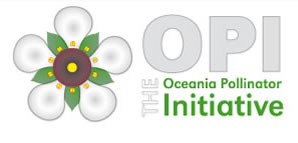About the Oceania Pollinator Initiative
The key functions of a Pollinator Initiative are to:
- Monitor pollinator decline, its causes and its impact on pollination services
- Address the lack of taxonomic information on pollinators
- Assess the economic value of pollination and the economic impact of any decline
- Promote conservation, restoration, and sustainable use of pollinators in agriculture & ecosystems
Why an Oceania Pollinator Initiative?
Pollination is an essential ecosystem service, and a prerequisite to all the other essential services provided by plants, yet in Australia, New Guinea and on the Oceanic Islands- we know very little about our pollinators. We lack information about the distribution and ecology of pollinators, taxonomy of insect pollinators, whether or not they are in decline, the ecosystem service role of native and introduced pollinators, the economic value of pollination services by unmanaged pollinators.
In August 2006, a group of Australian and New Zealand pollination ecologists, held a workshop, just prior to the joint meeting of the Ecological Society of Australia (ESA) and New Zealand Ecological Society (NZES), to discuss the International Pollinators Initiative (IPI) and the implementation of a local chapter of IPI. In March 2007, some of our members met with representatives of the IPI in FAO in Rome to discuss the formation of a regional initiative. We were encouraged to include a broad geographical area including facing potential food security issues, hence our name became the Oceania Pollinator Initiative.


